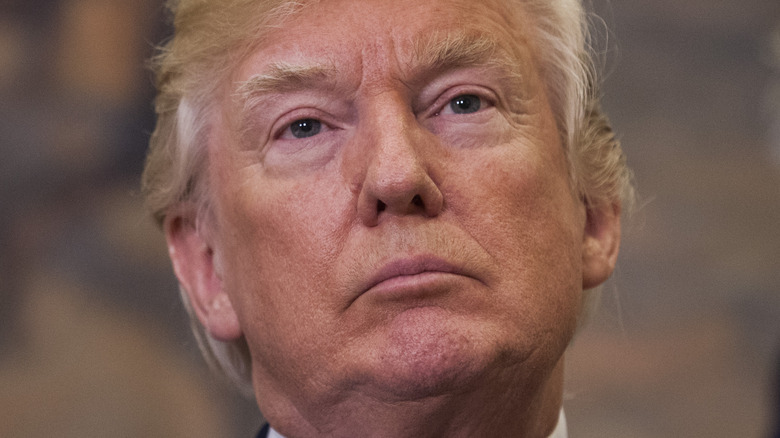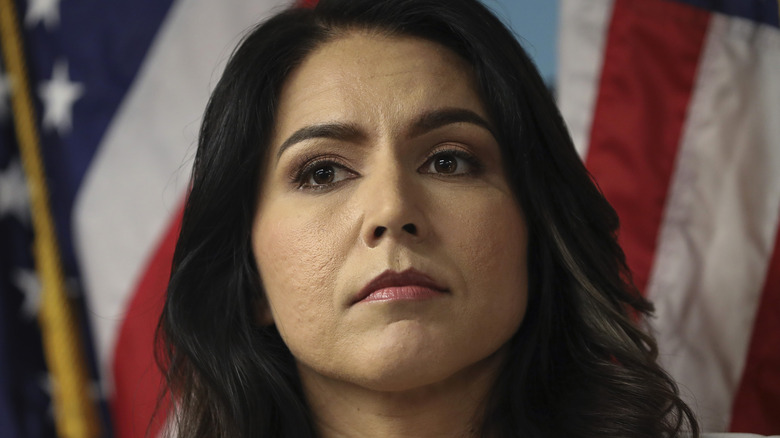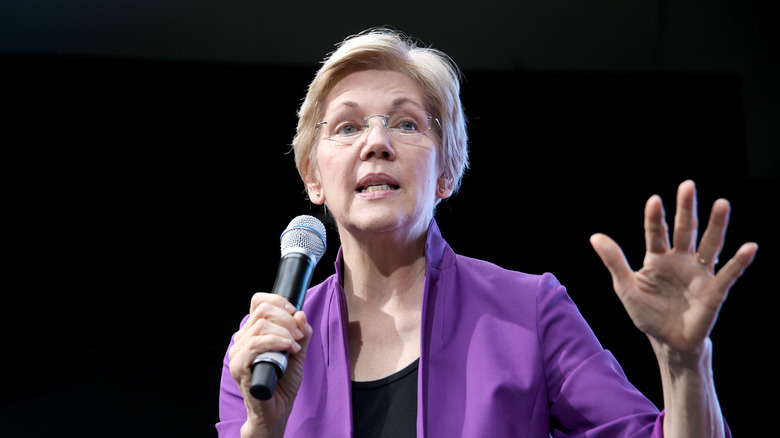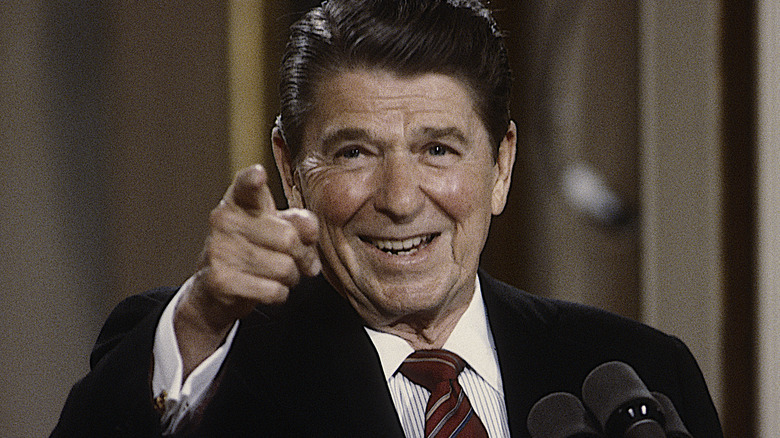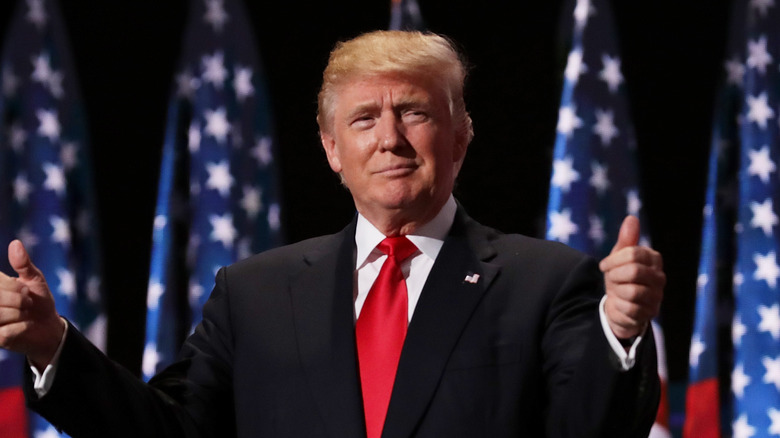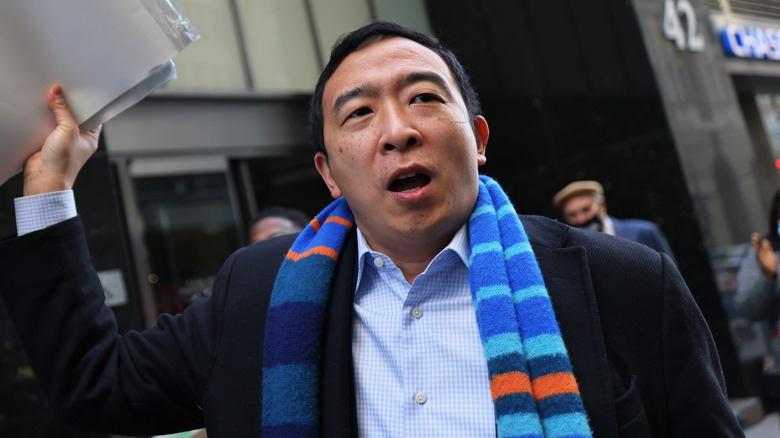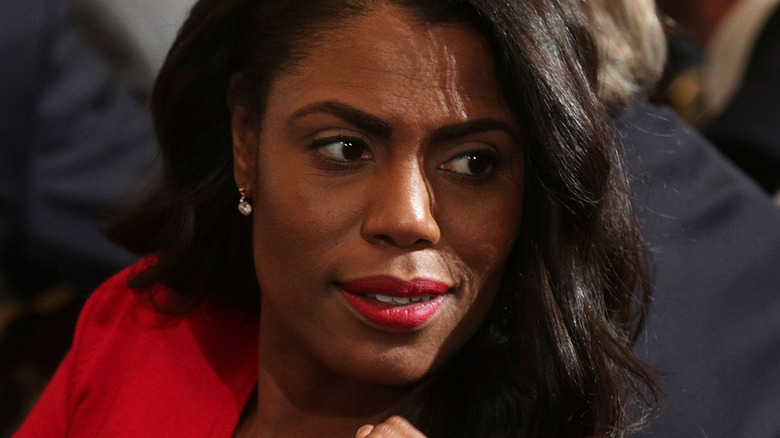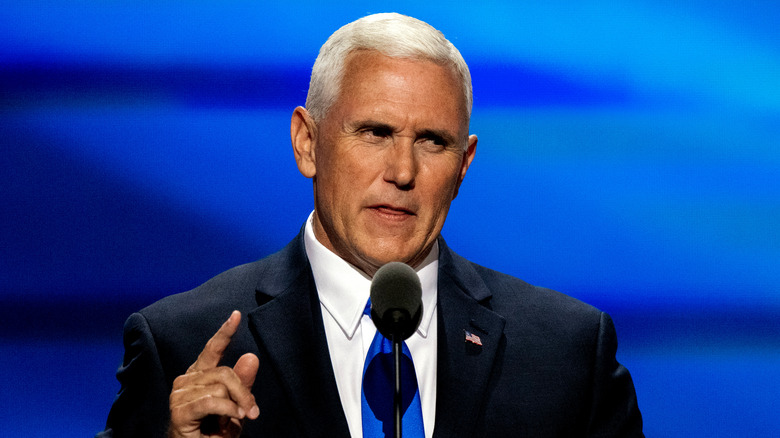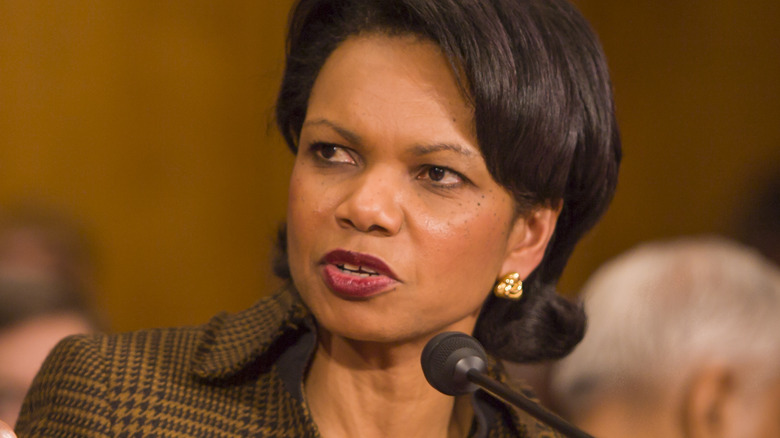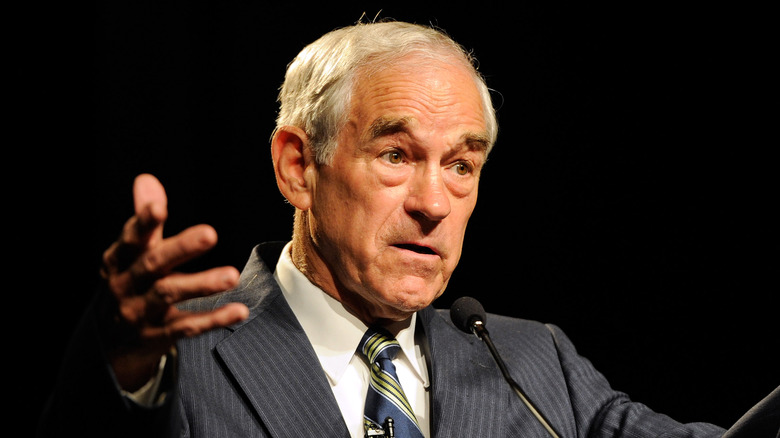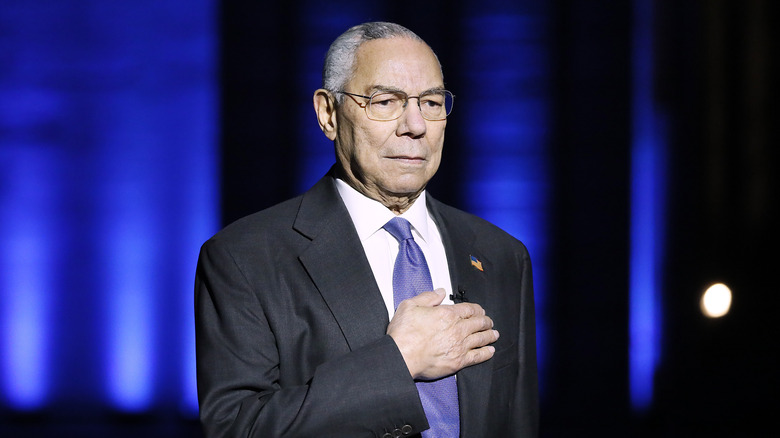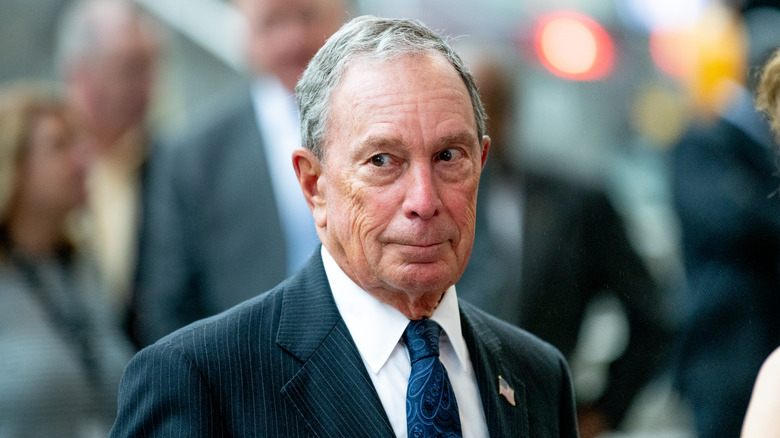Politicians Who Dumped Their Own Political Party
America has been a two-party system for a long time, but that hasn't stopped politicians from abandoning their loyalties to one of those parties over a variety of issues. For example, Senator Strom Thurmond, who was pro-segregation, left the Democrats in 1964 over civil rights, and Wendell Willkie switched parties three times thanks to his changing views on Franklin Delano Roosevelt. Even some of America's most famous presidents have abandoned their own allegiances.
Teddy Roosevelt, who had already been president for two terms, was so disappointed by how his successor William Taft was running the Republican party that he started his own party and ran for office in 1912. "The old parties are husks, with no real soul within either," he told voters, promoting his new Progressive party and claiming that the main parties were "divided on artificial lines ... neither daring to speak out wisely and fearlessly." The Progressives were also nicknamed the "Bull Moose party," which was popularized by a dramatic attempted assassination. When a lone gunman shot Roosevelt before a campaign speech, the former president reassured his audience that "it takes more than that to kill a bull moose," and continued to speak for 90 minutes while bleeding from his chest. Although Roosevelt was eventually beaten by Democrat Woodrow Wilson, he did get more votes than Taft.
Keep reading to find out which other prominent politicians have turned their back on the parties that first got them interested in changing the landscape of America.
Tulsi Gabbard
Former presidential hopeful and Democratic representative Tulsi Gabbard made waves when she formally disavowed her own political party in 2022. Although she endorsed Joe Biden after dropping out of the last presidential election, Gabbard had aligned herself with the Republican party on issues like abortion and LGBTQ+ rights. She also spoke about the importance of unity at the conservative conference CPAC, addressing an audience of Republicans.
"I can no longer remain in today's Democratic party," she wrote on Twitter, claiming that the party had been taken over by an "elitist cabal of warmongers driven by cowardly wokeness, who divide us by racializing every issue and stoke anti-white racism." The Hawaiian politician insisted that her fellow Democrats were undermining religious communities, the police, and America's borders. Gabbard also attacked Democratic leaders over their approach to Russia's invasion of Ukraine, which she has criticized before, insisting that they were "dragging us ever closer to nuclear war."
Since her split from the party, Gabbard has officially endorsed Republican Kari Lake in Arizona, despite Lake's history of conspiracy theories about the 2020 presidential election. The Hawaiian politician will also be joining Fox News as a contributor, according to The Hill, following several appearances on the conservative network over the past couple of months.
Elizabeth Warren
Elizabeth Warren might be famous as a progressive Massachusetts senator who spends her time fighting with billionaires, but she started out on the other side of the political spectrum. She was a registered Republican for five years, but left in 1996 over the party's pandering approach to Wall Street. "I was with the GOP for a while because I really thought that it was a party that was principled in its conservative approach to economics and to markets," the senator explained to ABC News (via the New York Post).
Warren, who made a name for herself by talking about bankruptcy and predatory financial institutions, observed that the party had abandoned the average worker. "I feel like the GOP party just left that," she stated, insisting that there was no such thing as a level playing field anymore economically. "And they really stood up for the big financial institutions when the big financial institutions are just hammering middle-class American families. I just feel like that's a party that moved way, way away."
Ronald Reagan
Before Ronald Reagan was a Republican president, he was a film star who campaigned for Democratic candidates and led a labor union of screen actors. Despite his previous support of Franklin Delano Roosevelt, Reagan swayed more toward the right during the rise of McCarthyism when he became an informant for the FBI and shared the names of rumored Communists in Hollywood, per the Chicago Tribune.
According to the Ronald Reagan Presidential Library, the actor started stumping for Richard Nixon while he was still a Democrat. At one event for the Republican, he admitted that he was still registered for the other party and a woman charged down the aisle offering to switch his registration on the spot. After officially switching sides in front of a live audience, he made a name for himself as a Republican, starting with a famous 1964 speech endorsing Barry Goldwater. During his own political career, Reagan wasn't afraid to talk about his past as a registered Democrat. "I didn't leave the Democratic Party. The party left me," he famously stated, per The Washington Post.
Donald Trump
When Donald Trump launched his presidential campaign in 2016, there was some confusion about whether he had always been a Republican. Political opponents like Jeb Bush accused him of having spent more time in left-wing spaces, per NBC News, declaring: "Mr. Trump doesn't have a proven conservative record." As Politifact discovered, the former reality show star had switched between parties several times over the years and was in fact affiliated with the Democrats for eight years, starting in 2001.
"I was from an area that was all Democrat," Trump told Face the Nation, defending himself against his Republican opponents. "And, frankly, over the years, I have — and especially as I have gotten more and more involved — I have evolved." He also compared himself to Ronald Reagan by pointing out how the former president changed his views over the years. And even while he was campaigning, he admitted to having beliefs across the party lines. "I identify with some things as a Democrat," he stated on MSNBC (via The Hill).
During his acrimonious final days as president, Trump also reportedly threatened to start his own party and break up the GOP voter base.
Andrew Yang
Andrew Yang broke up with the Democratic Party in 2021 after his bid to become president failed, launching a new political party that he had created himself.
"It was a strangely emotional experience," he reflected on his website, informing his fans that he had officially changed his registration. "And yet, I'm confident that no longer being a Democrat is the right thing." As the businessman explained, he didn't want to perform for the cameras and take part in partisan arguments. "My goal is to do as much as I can to advance our society," Yang continued, stating that nobody could make any progress in the current system. "Our system is stuck. It is stuck in part because polarization is getting worse than ever."
He took advantage of the momentum from his presidential campaign, including the millions he raised in donations, by starting the Forward Party. "We need to push for open primaries and ranked-choice voting in Congressional races around the country," Yang wrote on the party's website, insisting that the dichotomy of Democrats and Republicans wasn't working. "Washington D.C. is painfully behind the curve."
Omarosa Manigault Newman
Omarosa Manigault Newman was once a registered Democrat and Hillary Clinton supporter who previously worked for Al Gore. In a 2015 interview with The Washington Post, she wasn't exactly supportive of her former "The Apprentice" boss when he first launched a campaign. "I'm not going to touch that with a 100-foot pole," Manigault Newman stated in response to Donald Trump's comments about Mexicans, insisting that she would pray on his behalf. "I wouldn't even know how to respond to that — I mean, who would?"
But she became a member of Donald Trump's Republican inner circle when he appointed her as a political aide in 2016. "I've been very vocal about the fact that I had been a Democrat my entire life. As an African American, that's what we tend to do," Manigault Newman told The New York Times. "African-Americans are loyal to the Democratic party, but unfortunately, the Democratic party is not loyal to them." Her position with Trump didn't last, however, and the former reality show contestant wrote a tell-all book after she left the administration, accusing him of racism and misogyny.
Mike Pence
Years before he became a controversial Republican vice president, Mike Pence grew up in a Catholic family of Democratic voters. As The New York Times reported, the former governor of Indiana used to volunteer for the local Democrats and supported Jimmy Carter before converting to born-again evangelism and becoming a Reaganite. His family was reportedly disappointed that he had left behind his previous idol, John F. Kennedy.
"I started to identify with that kind of common-sense conservatism of Ronald Reagan," Pence told the IndyStar. "And before I knew it, I decided I was a Republican and moved up here in Indianapolis in 1983 to go to law school." In a speech at the Ronald Reagan Presidential Library, he spoke about meeting the president when he was 29 and being awe-struck by the presence of his hero. "His ideals inspired me to leave the party of my youth and become a Republican like he did," Pence stated, per The Orange County Register. "His broad-shouldered leadership inspired my life."
Condoleezza Rice
Condoleezza Rice made history when President George W. Bush, a Republican, made her his national security advisor and then the secretary of state. But she wasn't always tied to the Republican party, as The Washington Post reported. Rice went from being a registered Democrat to a Ronald Reagan supporter in her twenties due to Jimmy Carter's handling of foreign affairs after the Soviet Union's invasion of Afghanistan. And she quickly became one of the most recognizable faces in Bush's administration. "I think that for African Americans in particular, what I've been saying is just take another look," the diplomat stated, reflecting on how she had taken on the role of representing the Republicans.
In a speech at the Republican National Convention in 2000, she also spoke about her father's political beliefs and how he influenced her. "My father joined our party because the Democrats in Jim Crow Alabama of 1952 would not register him to vote. The Republicans did," Rice claimed, observing how deeply that situation impacted both of them. "I joined the party for different reasons. I found a party that sees me as an individual, not as part of a group." She also praised the Republicans for their family values and approach to diplomacy.
Ron Paul
Ron Paul abandoned the Republican party when he ran for president as the Libertarian party nominee in 1988. When he returned his membership card, Paul explained his reasoning in a dramatic letter. "There is no credibility left for the Republican Party as a force to reduce the size of government," he stated.
According to the Los Angeles Times, Paul admitted that he was fighting an uphill battle by campaigning as a third-party candidate. "I'm running because I believe the American people should have a true alternative," he insisted, adding that the goal was reaching a wider audience with their ideas. "The Republicans and Democrats have botched it up so bad there isn't much lower they can go." He also spoke about how his libertarian principles had distanced him from the Republican party, particularly over their high defense budget and interventionist foreign policy.
"The American people have never reached this point of disgust with politicians before," Paul declared. "I want to totally disassociate myself from the Reagan Administration." In the end, he received 431,399 votes and came in third in the popular vote.
Colin Powell
Although Colin Powell was suggested as a potential Democratic vice president in 1992, thanks to the top soldier's popularity, he later declared himself a Republican. "I think the Republican Party needs me more than the Democratic Party needs me," he later mused in an interview with MSNBC (via Politico). "And you can be a Republican and still feel strongly about issues such as immigration, and improving our education system, and doing something about some of the social problems that exist in our society and our country," he added, criticizing his own party's approach to immigration.
Powell later endorsed Barack Obama and Joe Biden, declaring after the 2020 Capitol Building invasion that he could no longer call himself a Republican. "I'm not a fellow of anything right now. I'm just a citizen who has voted Republican, voted Democrat throughout my entire career, and right now I'm just watching my country and not concerned with parties," he told CNN, calling for Trump's resignation and insisting that Republican politicians had enabled him in order to win votes. "They should have known better, but they were so taken by their political standing and how none of them wanted to put themselves at political risk. They would not stand up and tell the truth or stand up and criticize him, or criticize others."
Michael Bloomberg
Michael Bloomberg changed his registration from Democrat to Republican when he first ran for mayor of New York and replaced Rudy Giuliani in 2001, as the BBC reported. He later became an independent, criticizing the two-party system in a 2007 speech. "Washington is sinking into a swamp of dysfunction," Bloomberg insisted, adding that the American government was incapable of making any real changes since politicians were too afraid to lose votes. "No matter who's in charge, sadly today, Partisanship is King." He went on to claim that Washington was turning into a culture of fear. "It's become a contest to one-up the other side and to score points for the next election," he continued.
He later rejoined his original party in 2018, per Reuters, explaining that "we need Democrats to provide the checks and balance our nation so badly needs." And when Bloomberg announced that he would be throwing his hat into the ring during the 2020 presidential race, he decided to run as a Democratic candidate. "In 2020, the great likelihood is that an independent would just split the anti-Trump vote and end up re-electing the President," he tweeted. "That's a risk I refused to run in 2016 and we can't afford to run it now." Despite pouring his own money into the campaign, the billionaire politician dropped out after the other Democratic candidates embarrassed him during the debates by bringing up the "stop and frisk" policies from his past tenure as a Republican mayor, per NPR.

